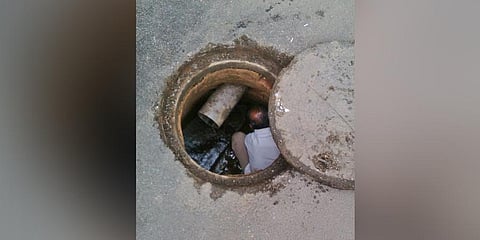

BENGALURU: Manual scavenging is banned in the country, but shockingly, there are roughly around 30,000 to 50,000 manual scavengers in Bengaluru city alone, according to the Safai Karmachari Kavalu Samithi (SKVS), a watchdog committee on sanitation workers in the state.
"Our estimate is based on the 2011 census data for the BBMP area. As per the census, in Bengaluru, 79.3% households are connected to underground drainage (UGD) system. The rest are single-pit or septic tank latrines, which are manually cleaned. This translates to over four lakh toilets, which are cleaned manually," Siddharth KJ, member of SKVS told The New Indian Express. Sanitation workers also double as manual scavengers, he added.
He said that manual scavenging is a "caste-based occupation and around 93% of manual scavengers are Dalits. Of them, 74% belong to the Madiga community. There are some newcomers, but most of them are second- and third-generation manual scavengers who have migrated from the undivided Andhra Pradesh in search of livelihood," said Siddharth.
The manual scavengers live in small low-income settlements in different pockets in the city such as Nagawara, Tanisandra, Saraipalya, Hegdenagar and Kacharakanahalli among others.
"There are three categories of manual scavengers, who are involved in cleaning septic tanks, manholes and single-pit latrines. The first are those involved full time in the job. Some of them also have machines to clean the tanks and charge more than those who clean manually. The second category make a living by doing other jobs like plumbing and working as pourkarmikas. The third are involved in construction activities and other menial labour and also do manual scavenging.
"Siddanna (18), who died in a septic tank on January 25, was a construction worker and had no previous experience of cleaning septic tanks. He was told to clean the tank by his mason Muniyanna, who owed him Rs 30,000.
Siddanna died of asphyxiation and the latter, who went after him into the tank died on Tuesday with sewage in his lungs," said Siddhartha. He said that no government agency is involved in cleaning private septic tanks. "The government should prevent and rehabilitate manual scavengers," he stressed.
The Safai Karamchari Development Corporation had identified 2,058 manual scavengers in Karnataka in 2018-19, said Corporation Secretary P Nagesh. "Out of these, 1,969 cases were approved and Rs 93 crore was sanctioned. We have already disbursed Rs 20 crore and the remaining Rs 73 crore will be released to the other beneficiaries soon. They are from Kolar," he added.
The Social Justice Department of the Centre has a scholarship scheme for pre-matric students whose parents are involved in unclean occupations. Manual scavenging has been identified as an unclean occupation. Principal Secretary, Department of the Social Welfare Department, Kumar Naik told TNIE that "All SC, ST primary school students are covered under the government scholarship schemes. The pre-matric scholarship for students whose parents are involved in unclean occupations will definitely be covered under the scheme," he said.